Urban agriculture is booming, and tips for starting with chickens are key. City coops have their challenges. This guide supports your journey into chicken-rearing confidently.
We aim to give you solid tips, from choosing breeds to handling city space limits. With smart planning, your city chicken coop can thrive. It’s a fulfilling endeavor.
Embracing the Beginner’s Mindset: A Foundation for Growth
Starting the backyard chicken care journey is exciting. Having a beginner’s mindset helps create a strong base for growth. This enthusiasm and eagerness to learn are key in building a successful urban chicken coop. As you begin, seeing problems as chances to learn is crucial. This attitude is what makes a novice grow in this venture.
The Power of Being a Novice
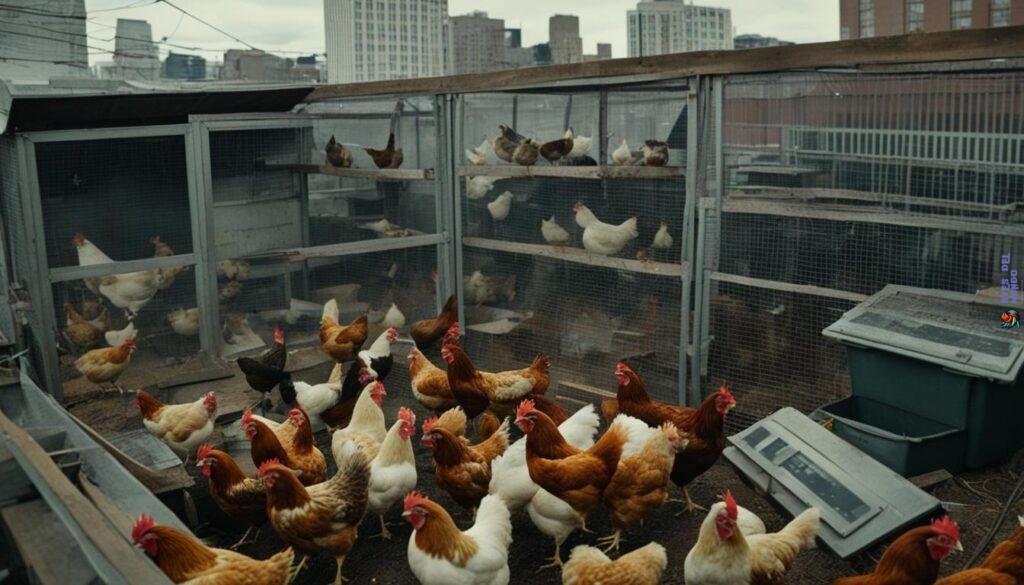
Approaching backyard chicken care with an open mind is vital. You become ready to soak up new knowledge. Every small step you take is important for growth. This mindset helps turn challenges into opportunities. The freshness of being a beginner brings innovation to caring for your chickens. This is a big change from the usual ways of doing things.
Learning, Improving, and Persisting
Raising chickens is all about continuous learning. Understand that learning is a forever journey. Your job is to keep improving how you care for your chickens. Making small changes to your care routine can help a lot. It shows how learning and improving go hand in hand. Being persistent is important, too. Even when things get tough, your dedication to your chickens stays strong. It’s this persistence that helps you grow from a novice to an expert.
Keep these ideas in mind as you care for your chickens. You’ll see your backyard flock flourish. Every day teaches you something new. And each lesson brings you closer to mastering chicken care in the city. Start this journey with excitement and an open heart. This is where your true growth begins.
The challenges of raising chicks in your garden
Starting your backyard chicken care adventure is rewarding but comes with challenges. Challenges of raising chicks in your garden range from predator protection to keeping a healthy environment. With strategic planning and dedication, you can overcome these small flock chicken raising obstacles.
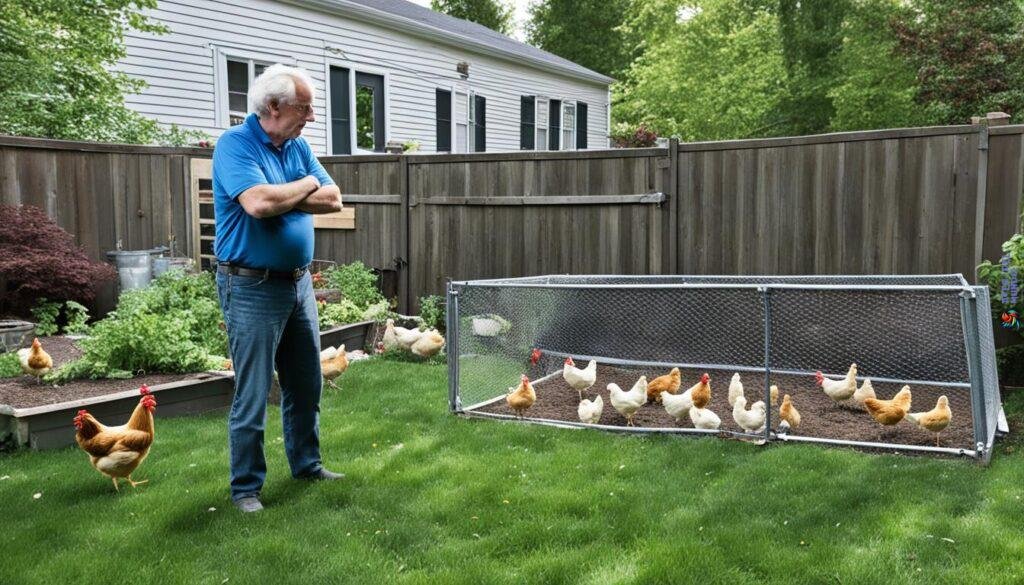
Many face suburban poultry challenges like limited space. You must be creative to make your yard comfortable and safe for your chickens. Also, being ready to tackle health issues quickly is crucial for your flock’s well-being.
- Understanding local predator types and behaviors
- Implementing effective containment and protection strategies
- Recognizing and responding to health concerns early
- Complying with suburban area regulations and ordinances
- Optimizing space within your property to house your chickens
Protecting your coop from predators is a major task in backyard chicken care. It can be daunting for beginners. Here’s a guide with key considerations for keeping your flock safe and healthy.
| Consideration | Detail | Action |
|---|---|---|
| Predator Proofing | Identifying potential threats in your specific area | Installation of secure fencing and covers |
| Health Checks | Watching for signs of illness or distress | Regular observation and prompt veterinary care |
| Space Management | Designing coop layout to utilize available space efficiently | Implementing vertical space solutions |
| Legal Compliance | Understanding local laws regarding chicken raising | Adjusting flock size and coop specifications as needed |
| Feeding and Care | Maintaining a nutritious diet and clean habitat | Establishing a routine for feeding and cleaning |
By tackling these points, you’ll navigate small flock chicken raising obstacles successfully. Stay informed and prepared, making your garden a haven for your chicks and a pride source for you.
Planning Your Path: Beginning with the End in Mind
Starting a journey in backyard poultry care requires planning your path thoughtfully. It means thinking about your goals before you start – and knowing the steps to get there. This strategy helps you avoid potential issues, like making sure you have backyard chicken predator protection early on.
Setting Clear Goals for Your Chick-Raising Adventure
Before picking your chicken breeds or planning your coop, stop to set clear goals. Ask yourself why you want to raise chickens. Do you want fresh eggs, meat, or just enjoy their company? Maybe you like the idea of living sustainably or teaching your family new things. Clear goals help you make good decisions and stay motivated, even when it’s tough.
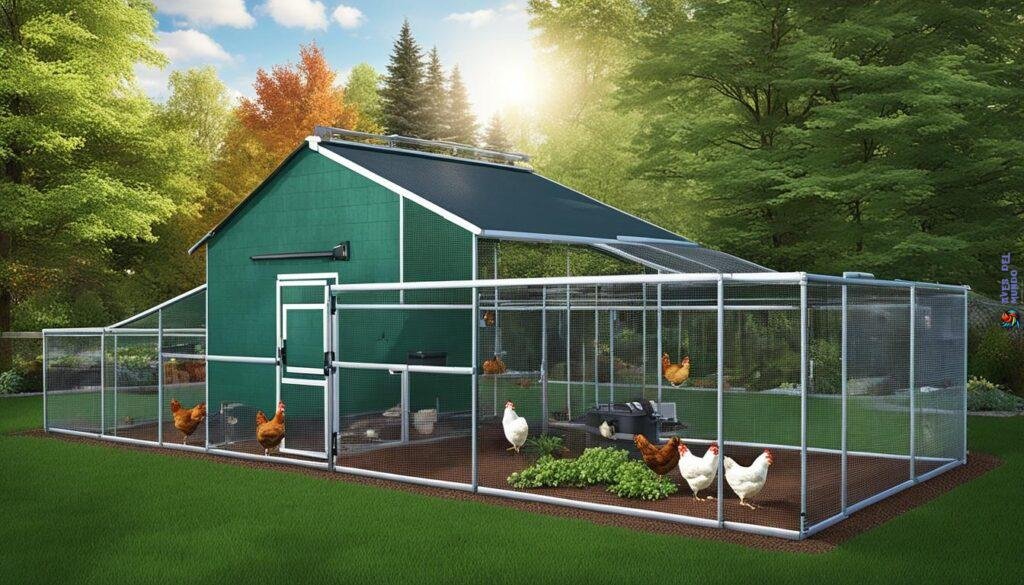
To be good at time management in chicken care, you need to know the tasks that come with it. It’s about scheduling things like feeding, cleaning the coop, checking chicken health, and keeping predators away. Starting with a good plan makes your efforts more effective and avoids common mistakes in chicken care.
Time Management: Maximizing Efforts from Day One
- Feeding: Have a fixed schedule for feeding to keep your chickens used to a routine.
- Cleaning: Clean regularly to avoid diseases.
- Health Checks: Check your chickens’ health often to catch problems early.
- Predator Checks: Regularly check your coop and fences to ensure safety from predators.
Don’t forget to think about the changing seasons and their impact on your chicken care routines. Are there cold times needing extra prep, or hot times when keeping your flock cool and hydrated is crucial? Knowing and planning for these things helps you care for your chickens all year round.
| Daily Tasks | Weekly Tasks | Seasonal Tasks |
|---|---|---|
| Morning feeding | Deep coop cleaning | Winterization of coop |
| Water refreshment | Predator perimeter checks | Summer ventilation checks |
| Egg collection | Health assessments | Feed and water system adjustment |
| Evening feeding and headcount | Coop repairs and maintenance | Flock dietary adjustments |
Whether you’re an experienced chicken owner or just starting, planning your path and setting clear goals are important. So is having a solid time management plan and good backyard chicken predator protection. They’re key to a rewarding chicken-raising experience.
Motivation and Its Role in Navigating New Beginnings
Starting a backyard poultry care journey needs a lot of motivation. Knowing the difference between internal motivation and external motivation factors is crucial for your urban chicken coop’s success. It’s key to understand why you want to raise chicks. These reasons help you keep going, even when it gets tough.
Internal vs. External Motivation Factors
Motivation in poultry care comes from within and from the world around you. Internal motivation includes things like enjoying nature, wanting to provide for your family, or living sustainably. External motivation comes from outside, like praise from your community or helping the planet.
Both internal and external motivations are important. They work together to make you determined in urban chicken coop management. This section will show how to use these motivations well.
Finding Your Motivation in Backyard Chicken Care
Understanding your main reasons is a game-changer. Think about what drives you to care for poultry. Maybe it’s being independent or raising healthy animals. Also, think about the external motivation factors that matter to you. This could be community expectations or wanting to reduce your environmental impact.
To keep motivation strong, picture your goals clearly. Imagine the perfect coop and remember why you started. Chicken care is about looking after your chickens and your passion.
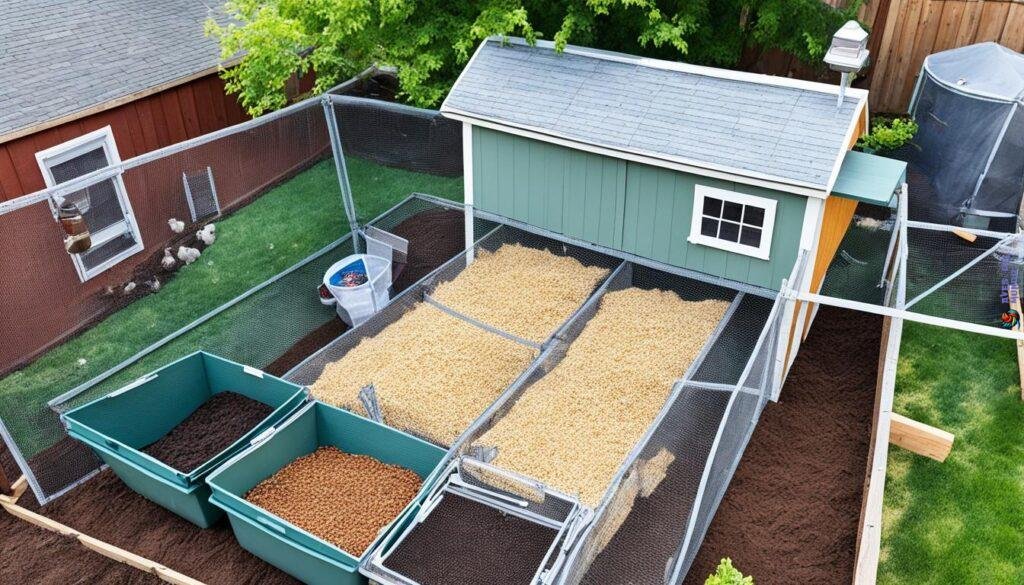
In summary, let internal and external motivations lead you in poultry care. When faced with challenges, think back to these motivations. They’ll help reignite your enthusiasm and push you forward in backyard chicken raising.
Persistence Over Perfection: The Art of Carrying On
Starting your journey with backyard chicken care teaches resilience. As you enjoy daily activities with your flock, persistence in backyard chicken care proves vital. Facing issues like sick birds or creating safe spaces shows progress and learning, not failure. Through challenges, you’ll find solutions that mix urban life with chicken raising’s quiet peace.
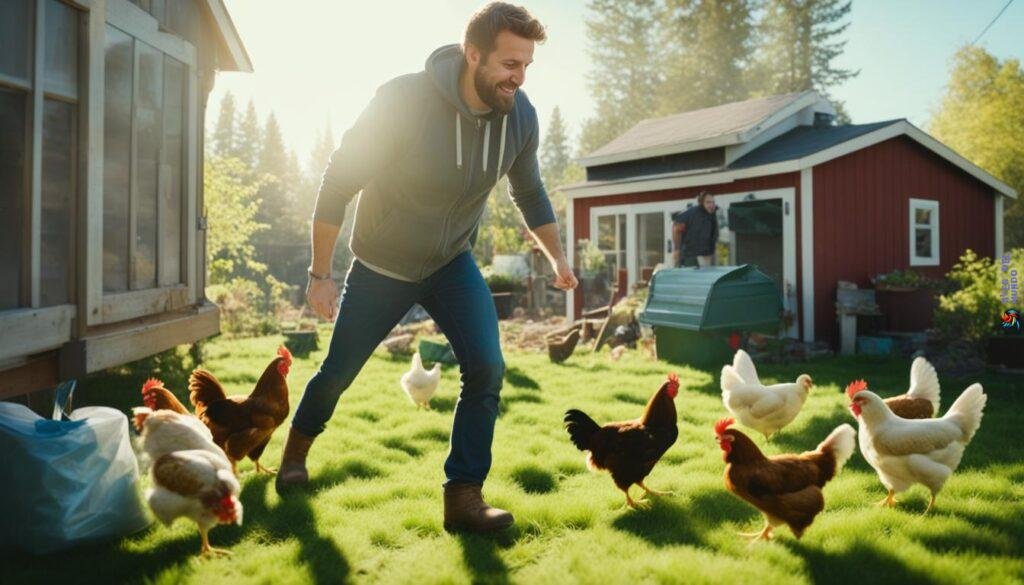
Overcoming suburban poultry challenges requires steady, small efforts. Deal with dangers like foxes or caring for hens in cold weather with determination. This spirit keeps your coop alive. Below are tips to help:
- Check your chickens’ health and coop safety regularly.
- Join local poultry clubs for advice and new solutions.
- Spend time each week learning about chicken care and staying current with best practices.
Carrying on with chicken raising shows your commitment. This commitment fuels growth for you and your flock. Every day allows you to prove your dedication to your coop. Each obstacle offers a chance to become a more skilled and tough chicken keeper.
Remember, every expert chicken keeper started as a beginner, facing familiar challenges. Mastery isn’t about avoiding failure, but in getting back up each time you fall.
Learning Through Experience: Following a Proven Path
Raising chickens in a city or suburb means learning through experience. Mixing your own trials with proven chicken raising strategies will help you succeed. This blend of action and knowledge prevents urban chicken coop problems and keeps your birds healthy.
Seeking Guidance in Urban Chicken Coop Management
Getting advice from an experienced mentor is incredibly helpful in guidance in poultry raising. They know how to handle the limited space and care for flocks in the city. Their advice helps you tailor methods to fit your urban space, creating a good home for your chickens.
Adapting Proven Strategies for Suburban Poultry Challenges
In suburbs, facing large predators or strict rules needs proven strategies tailored to these issues. Use solutions others in similar areas have succeeded with. This shared knowledge boosts your coop’s success and resilience.
| Strategy | Benefit | Application |
|---|---|---|
| Space-efficient Coop Design | Maximizes limited area | Structures that capitalize on vertical space |
| Predator-proofing Measures | Ensures chicken safety | Secure fencing and coop reinforcements |
| Waste Management Systems | Enhances cleanliness and reduces odor | Composting bedding & manure |
| Feed and Watering Solutions | Efficient nourishment provision | Automated dispensers to save space and time |
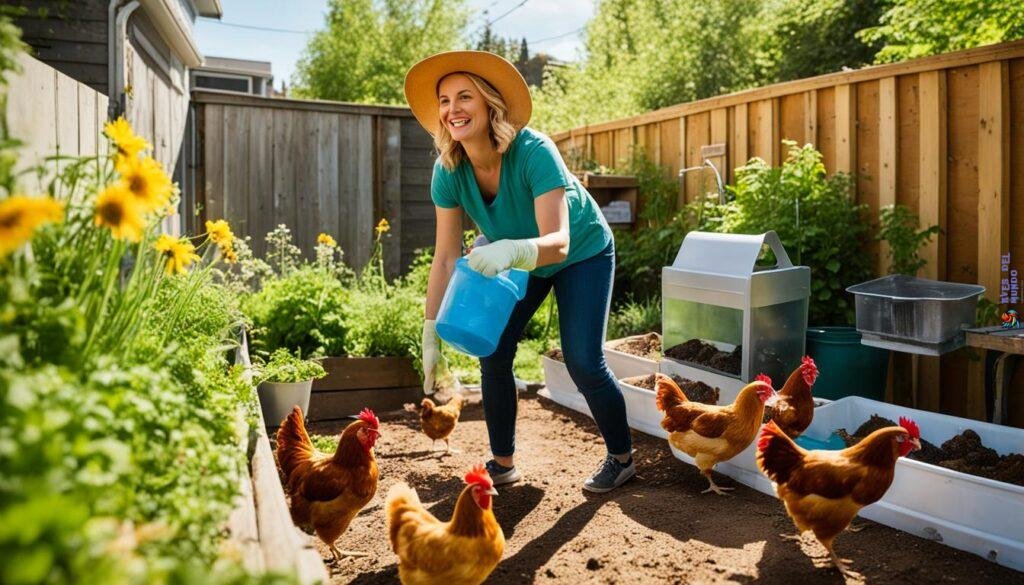
Finding Community and Support in Your Endeavors
Starting your journey in poultry raising can feel overwhelming. This is especially true when dealing with the complexities of overcoming chicken raising challenges. But, you’re not alone in this. There is a significant community support in poultry raising for individuals like you. They are ready to share their knowledge and give support. This network can help improve your skills and confidence with your flock.
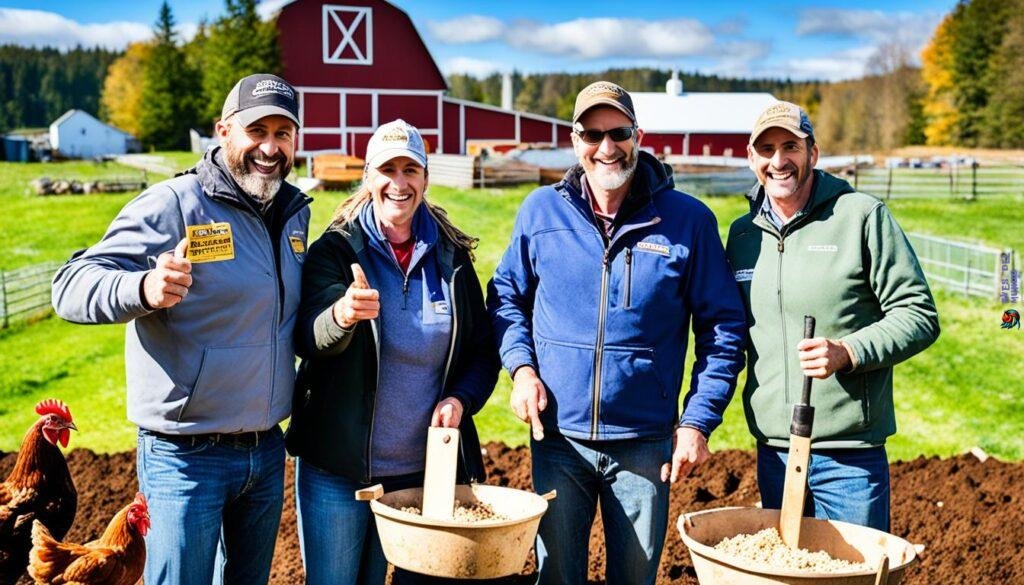
Accessing support networks for poultry care can change the game for you. It offers a place to share ideas and find solutions to common problems. This could be through local workshops or online forums with other chicken lovers. Being part of these communities can vastly upgrade your chicken care methods.
Remember, every question you have has been asked before, and every problem you encounter has likely been solved by someone in the community.
Below is a table showing common chicken raising issues and how community support can help you tackle them:
| Challenge | Community Support Offering | Benefit |
|---|---|---|
| Space constraints | Coop design workshops | Maximizing limited space effectively |
| Predator protection | Shared experiences on local wildlife | Implementing proven deterrent strategies |
| Nutrition and health | Advice from experienced raisers | Optimizing flock health and egg production |
| Behavioral issues | Online discussion forums | Understanding and managing flock dynamics |
Connecting with fellow chicken lovers brings more than answers. It brings friendship. Take advantage of the support networks for poultry care out there. Make your move from beginner to expert a journey shared with others. The strength found in community is key when it comes to overcoming chicken raising challenges.
Small Flock Chicken Raising Obstacles and How to Overcome Them
Starting your journey with a small flock in the backyard has its challenges. Knowing the problems you might face with poultry raising helps a lot. With the right knowledge and enthusiasm, you can create a thriving community of chickens.

Understanding Backyard Chicken Health Risks
Learning about health risks is crucial when raising chickens. Diseases like salmonella and Marek’s disease are real threats. By vaccinating, doing regular check-ups, and keeping the coop clean, you can keep these risks low.
Combatting Common Obstacles in Raising a Small Flock
When raising a small flock, you’ll face challenges like limited space and strict rules. Challenges like coop design or biosecurity teach us a lot. Being prepared and aware helps you give your chickens a good life.
- Regularly monitor your flock for any signs of illness.
- Keep your coop clean to prevent disease and parasite infestations.
- Stay informed about local regulations that might affect your chicken raising efforts.
- Implement biosecurity measures to protect your flock from outside contaminants.
Getting help from poultry lovers is key to overcoming challenges. Joining local communities and sharing resources is very helpful. Your commitment to learning and adapting is essential for a thriving flock.
Incorporating Resilience: You Are Not Alone in the Struggle
Running into problems is common when raising chickens, but building resilience in chicken raising is key. Luckily, a strong chicken raising support network exists to help you. Let’s dive into the key resources that will support you.

Building a Network for Chicken Raising Support
A good support network offers comfort and advice during hard times. By joining a chicken raising support network, you gain solidarity and encouragement. This network, found both online and locally, offers diverse advice to keep you going.
Utilizing Online Forums and Local Workshops
Being part of online forums for poultry care gives you access to a lot of knowledge. Here, you can swap stories, get help, and find answers to both typical and rare problems. Local chicken raising workshops, on the other hand, provide hands-on learning and expert advice. These tools not only help you learn but also build your toughness in chicken raising.
Comprehensive Predator Protection for Your Backyard Chickens
Keeping backyard chickens means being aware they are at risk from predators. It’s crucial to have comprehensive predator protection to keep them safe. Here are some ways to make sure your coop is secure and your chickens are protected.
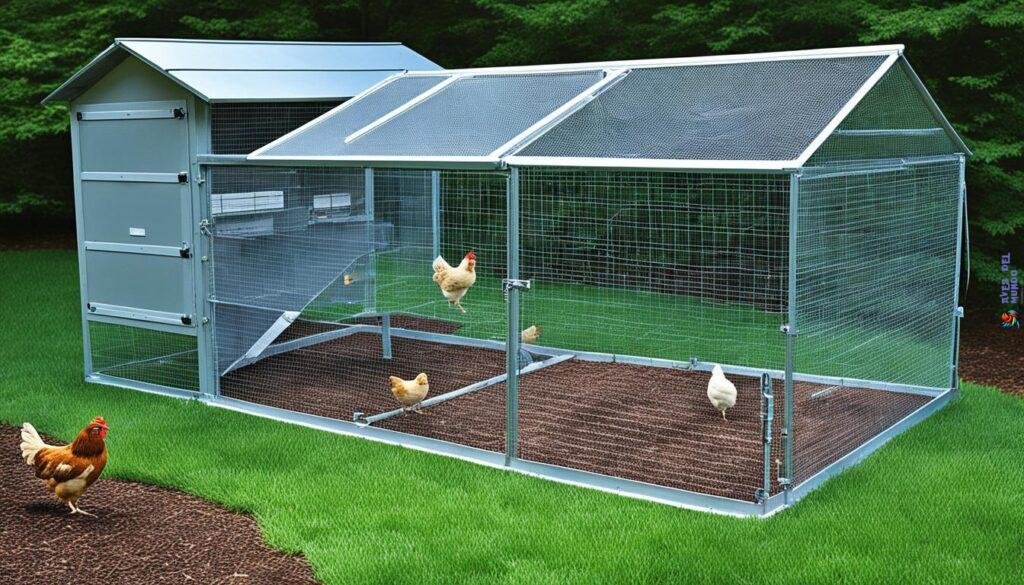
The coop is your first line of defense. Check it regularly for any weak spots. Make sure all entry points are locked securely and all gaps are covered to stop animals like raccoons or snakes. Putting a wire mesh in a trench around the coop can help stop animals that try to dig their way in.
- Fencing: Use heavy-duty hardware cloth instead of chicken wire—which predators can tear through—to cover all open spaces.
- Latches: Invest in predator-proof latches that raccoons can’t open, often referred to as raccoon-proof or guillotine-style latches.
- Roofing: Ensure your coop has a solid roof to prevent aerial predators from gaining access.
- Nighttime routines: Consistently lock chickens in the coop from dusk till dawn to safeguard against nocturnal predators.
You can also add extra layers of protection:
- Create a buffer zone around the coop with motion-sensor lights or deterrents like ultrasonic devices.
- Use guardian animals such as dogs, geese, or guinea fowl that naturally scare away predators.
- Keep the area around the coop clean and clear to reduce hiding spots for predators.
It’s important to learn about local predators and their habits. This way, you can tailor your protection efforts to be more effective. Sometimes, what works for one predator won’t work for another.
Protecting your chickens with comprehensive predator protection is key. It ensures their safety and supports a sustainable way of caring for backyard chickens.
| Predator | Type | Common Method of Attack | Recommended Deterrents |
|---|---|---|---|
| Raccoons | Small Mammal | Reaching through gaps, unlocking simple latches | Raccoon-proof latches, tight wire mesh |
| Hawks | Bird of Prey | Aerial swooping, daytime attacks | Covered run, roosting bars |
| Foxes | Canine | Digging under fences, twilight hunting | Buried wire mesh, secure nighttime enclosure |
| Snakes | Reptile | Sneaking into nests, eating eggs or chicks | Fine mesh wire, egg decoys |
Improving your backyard chicken care and comprehensive predator protection benefits both you and your chickens. Start taking steps today to protect your flock. This will make your experience as a chicken keeper even better.
Maximizing Limited Space: Tackling Poultry Raising Space Constraints
Urban chicken fans struggle with poultry raising space constraints. This challenge calls for creativity and smart planning. For those in the city, finding ways to use space wisely is key. This goes beyond looks—it’s crucial for your chickens’ wellbeing.
Think about using multi-level coops to take advantage of high spaces. These can grow or change as you need them to. Mobile coops also offer flexibility and make smart use of your land. Every bit of space saved means a happier home for your chickens.
Garden lovers can blend coops and gardens into a joint space. This turns space limits into a plus for both plants and chickens. You’re not just squeezing in a coop; you’re making a home that helps both your garden and birds. With some planning and creativity, small spaces can lead to a rich backyard life.



